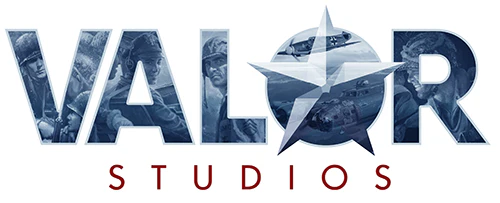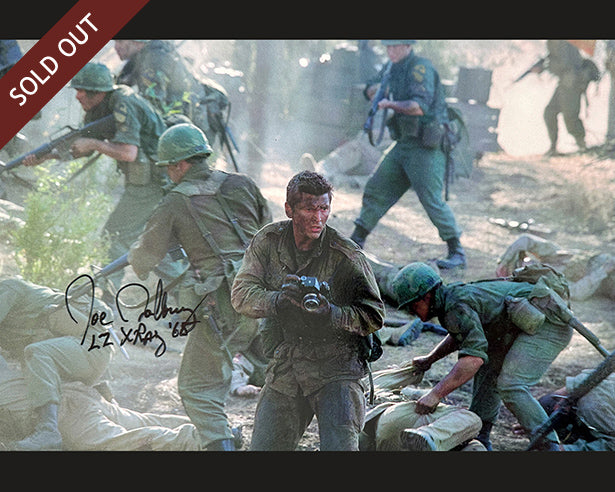-
This color photo from the set of "We Were Soldiers" shows war correspondent Joe Galloway (actor Barry Pepper) as he photographs the Battle of Ia Drang raging around him. This photo is autographed in black marker by the real Joe Galloway, the only civilian to be awarded the Bronze Star with "V" for Valor during the Vietnam War.
We were fortunate to host Joe at our Valor Studios stand during the 2018 "Show of Shows" militaria event where he signed a small number of these photos. They quickly sold-out at the show but not before we reserved a small number to later make available to our collectors. We're excited to say that day has arrived so orders yours now before they're history!
Shipping added in checkout // photo size: 8" x 10" // ships flat in a heavy-duty envelope
-
"Joe Galloway, Vietnam War correspondent who inspired the movie ‘We Were Soldiers,’ dies"
BY Michael Biesecker, August 18, 2021
Longtime American foreign correspondent Joseph L. Galloway, best known for his book recounting a pivotal battle in the Vietnam War that was made into a Hollywood movie, has died at age 79.
A native of Refugio, Texas, Galloway spent 22 years as a war correspondent and bureau chief for United Press International, including serving four tours in Vietnam. He then worked for U.S. News & World Report magazine and Knight Ridder newspapers in a series of overseas roles, including reporting from the Persian Gulf War in 1991.
Galloway died Wednesday morning, his wife Grace Galloway said, after being hospitalized near their home in Concord, N.C. He is also survived by two sons and a stepdaughter.
“He was the kindest, most gentle and loving man,” Grace Galloway said. “He loved the boys and girls of the U.S. military. He loved his country.”
With co-author retired U.S. Army Lt. Gen. Hal Moore, Galloway wrote “We Were Soldiers Once ... and Young,” which recounted his and Moore’s experience during a bloody 1965 battle with the North Vietnamese in the Ia Drang Valley. The book became a national bestseller and was made into the 2002 movie “We Were Soldiers,” starring Mel Gibson as Moore and Barry Pepper as Galloway.
Galloway was decorated with a Bronze Star Medal in 1998 for rescuing wounded soldiers under fire during the Ia Drang battle. He is the only civilian awarded a medal of valor by the U.S. Army for actions in combat during the Vietnam War.
After reporting from the front lines during Operation Desert Storm, Galloway was the co-author of “Triumph With Victory: The Unreported History of the Persian Gulf War.” As he approached age 50, that was Galloway’s last combat assignment but not the end of his career covering the U.S. military.
In 2002, Knight Ridder asked Galloway to return to reporting after a stint as an advisor to Secretary of State Colin Powell to bolster its Washington bureau’s skeptical coverage of the Bush administration’s case for ousting Iraq President Saddam Hussein.
Galloway did that by contributing, often anonymously, to his colleagues’ stories and by writing a column that often was critical of Vice President Dick Cheney, Defense Secretary Donald H. Rumsfeld and their aides who were bent on invading Iraq.
John Walcott, Galloway’s longtime editor and friend, recounted how an exasperated Rumsfeld finally asked Galloway to meet with him alone in his office. When Galloway arrived, he was greeted by Rumsfeld — and a group of other high-ranking Pentagon officials.
“Good,” Galloway reported when he returned to the Knight Ridder office. “I had ‘em surrounded.”
Galloway then described how after Rumsfeld accused him of relying on retired officers and officials, he told the group that most of his sources were on active duty, and that some of them “might even be in this room.”
Asked by his colleagues if that was true, Galloway replied: “No, but it was fun watching ’em sweat like whores in church.”
Galloway’s contributions to Knight Ridder’s critical coverage of the Bush administration’s case for invading Iraq was later portrayed in another movie, Rob Reiner’s “Shock and Awe,” in which fellow Texan Tommy Lee Jones played Galloway.
Clark Hoyt, former Washington editor for Knight Ridder, said it was a privilege to work with Galloway, whom he called one of the great war correspondents.
“He earned the trust and respect of those he was covering but never lost his ear for false notes. as shown by his contributions to Knight Ridder’s skeptical reporting on the run-up to the Iraq war,” Hoyt said.
Walcott said he was an exemplar of what journalism should be. From the People’s Army of Vietnam to Rumsfeld, no one ever intimidated Galloway other than his wife Gracie, Walcott said.
“He never went to college, but he was one of, if not the, most gifted writers in our profession, in which his death will leave an enormous hole at a time when our country desperately needs more like him,” Walcott said. “He never sought fame nor tried to make himself the star of his stories. As sources, he valued sergeants more than brand-name generals and political appointees.”
- We recommend that all autographed items be displayed or stored using archival quality, acid free materials away from any moisture or strong light exposure. When framing art/photographs/posters, we recommend locating a framer who is familiar with archival framing, has a storefront so you can see examples of their work, is not within a big box store, and has full insurance in the event an accident occurs while framing your item.
UV blocking glass/acrylic, spacers, and acid free framing materials must be used to protect the image and signatures. Fading can occur even if an item is not displayed in direct sunlight (even a light bulb omits UV rays) so UV blocking glass/acrylic is necessary. Acid free spacers or mat board must also be utilized to prevent the signatures from direct contact with the top layer of glass/acrylic. If a signature is pressed against the clear material it will lift off the photo/poster/print and deteriorate.
In order to retain full value of your item, your art or collectible should be able to be removed from its frame or storage container and still be in the same original condition as it was when purchased from Valor Studios.
If you decide to store one of our art prints/collectibles without getting it framed, then we recommend flat storage in either an acid free art sleeve or between pieces of acid free foam core. The item should be stored in a dark and dry location, several inches off the floor. We do not recommend storing prints/posters/photos in tubes for any extended length of time.








